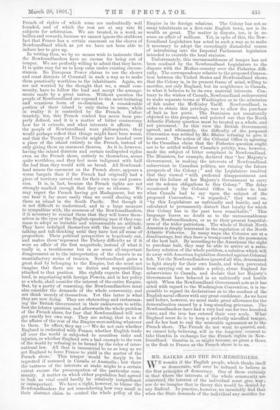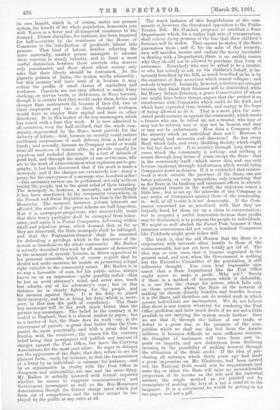MR. RAIKES AND THE BOY-MESSENGERS.
WE wonder if the English people, -which thinks itself so democratic, will ever be induced to believe in the first principles of democracy. One of these certainly is, that where the interests of the whole community are concerned, the interest of the individual must give way ; nor do we imagine that in theory this would be denied by any Radical. In practice, however, we invariably find that when the State demands of the individual any sacrifice for its own benefit, which is, of course, under our present system, the benefit of the whole population, democrats join with Tories in a fierce and ill-tempered resistance to the demand. Prison discipline, for instance, has been impaired for half-a-century by the resistance of the House of Commons to the introduction of profitable labour into prisons. That kind of labour, besides relieving the rates materially, enables prison managers to educate their convicts in steady industry, and to draw a most useful distinction between those convicts who deserve only punishment, and those about whom society only asks that their liberty should be restrained. In the gigantic prisons of India, the system works admirably ; but this country will have none of it, because it may reduce the profits of small classes of capitalists and workmen. Convicts are not even allowed to make Army clothing, or service boots, or field-tents, or Navy biscuits, though it is certain that they would make them better and cheaper than contractors do, because if they did, two or three employers and two or three thousand workmen would have to employ their capital and time in other directions. So in this matter of the boy-messengers, which has raised such a fuss this week. It is now admitted in all countries, even the half-civilised, that the whole com- munity, represented by the State, must provide for the delivery of letters,—first, because no country could endure accidental suspensions of such delivery from a failure of funds ; and secondly, because no Company could or would treat all receivers of letters alike, or provide equally for populous and secluded districts. By a sort of miracle of good luck, and through the insight of one or two men, who are to the work of administration what explorers are to geo- graphy, it has been discovered that if the work is made a monopoly, and if the charges are excessively low—fancy a penny for the conveyance of a message nine hundred miles —this necessary service can be performed, not only without taxing the people, but to the great relief of their taxation. The monopoly is, however, a necessity, and accordingly it has been sanctioned by the community everywhere, in the French and Swiss Republics no less than in the British Monarchy. The moment, however, private interests are affected, the results of the great scheme are half-forgotten. Now it is newspaper-proprietors who successfully insist that their heavy packages shall be exempted from letter- rates ; and again it is Postal Companies, delivering within small and populous areas, which demand that, as far as they are concerned, the State monopoly shall be infringed, and that the Postmaster-General shall be censured for defending a privilege which is the key-stone of the system so beneficial to the whole community. Mr. Raikes is actually described this week by all manner of democrats as the meanest of tyrants, because, in direct opposition to his personal interests, which of course require that he should not make enemies, he insists on preserving a legal right valuable to the community intact. Mr, Raikes is in no way a favourite of ours, for his public action always leaves on us an impression—quite possibly unfair—that he has an acrid attorney's mind, and never sees, much less admits, any of his adversary's case ; but in this instance he is clearly fighting for the people, and his enemies against them. It is his duty to guard their monopoly, and he is doing his duty, which is, more- over, in this case the path of expediency. The State boy-messenger will do his work much better than the private boy-messenger. The belief to the contrary is so rooted in England, that it is almost useless to argue ; but as a, matter of fact, the State does its work—say, in the conveyance of parcels—a great deal better than the Com- panies do, more punctually, and with a great deal less friction with the receivers ; the reason for the contrary belief being that newspapers will publish any amount of charges against the Post Office, but leave the Carrying Associations for the most part alone. So eager in obloquy are the opponents of the State, that they refuse to see the plainest facts,—such, for instance, as that the transmission of a letter by an individual—a cabman, for instance—and by an organisation in rivalry with the Post Office in cheapness and universality, are one and the same thing. Mr. Raikes is actually pestered with formal inquiries whether he means to suppress commissionaires and Government messengers as well as the Boy-Messenger Associations, though the former charge rates which put them out of competition, and the latter cannot be em- ployed by the public at any rates at all. The worst instance of this forgetfulness of the com- munity is, however, the threatened opposition to the Public Trustee Bill. Mr. Goschen proposes to establish a State Department which, for a rather high rate of remuneration, shall relieve dying persons of the fear that their children's fortunes will be stolen. They cannot be stolen if the State guarantees them ; and if, for the sake of that security, men will sacrifice income and endure the worry inevitable in dealing with a Department, there is no earthly reason why they should not be allowed to purchase that form of assurance. Everybody who may be asked to be a trustee, or who has nobody to ask on his children's behalf, is im- mensely benefited by the Bill, as much benefited as he is by the existence of dear securities which cannot collapse ; and nobody is injured. Instantly, however, solicitors are enraged because they think their business will be diminished, while Sir Henry Selwin-Ibbetson, a grave Conservative of whom one might hope better things, argues that the project is an interference with Companies which could do the work, and which have expended time, trouble, and energy in the hope of being allowed to do it. That is a mere plea for asso- ciated profit-earners as against the community, which wants a trustee who can be relied on, not a trustee who may or may not be solvent, may or may not be honest, and may or may not be unfortunate. How does a Company offer the security which an individual does not ? Because it has capita], and accounts, and directors ? So has every Bank which fails, and every Building Society which ought to fail but does not. It is security through long Mrms of years which the community is seeking ; and nothing is secure through long terms of years except the State—that is, the community itself—which never dies, and can only become bankrupt through misfortunes which would bring Companies down in sheaves. If it is contended that trustee- work is work outside the province of the State, one can listen patiently, or even sympathise, only remarking that as the State in its banking and insurance offices is already the greatest trustee in the world, the objection comes a little late ; but to set up the interests of any Company or any series of Companies against those of the community, is,—well, at all events it is not democratic. If the Com- panies concerned are so interfered with that they are unjustly fined, let them set up a claim to compensation ; but to suspend a useful innovation because their profits may be diminished, is to postpone the people to individuals. We might as well abolish the Parcel Post, because if that immense convenience did not exist, a hundred Companies like Pickfords might grow richer still.
The truth is, that the old illusion that the State is a corporation with interests often hostile to those of the commonwealth, has not yet been totally got rid of. The idea was so true once, that it became engrained in the general mind, and now, when the Government is nothing but the Executive Committee of the population, it still influences thought. You even hear reasonable men assert that a State Department like the Post Office ought never to make a profit. Why not ? Surely if there is a method of taxation which is defensible, it is one like the charge for letters, which falls only on those persons whom the State at the moment of making its charge directly benefits, and benefits because it is the State, and therefore can do needed work to which private individuals are incompetent. We do not believe that there is any reason whatever for rendering the Post Office profitless, and have much doubt if we are not a little prudish in not carrying the system much farther. Sure we are that if, through the failure of our trade, or defeat in a great war, or the pressure of the com- petition which we shall one day feel from the Asiatic millions, it becomes difficult to raise sufficient revenue, the thoughts of statesmen will turn from new im- posts on imports, and new deductions from declining incomes, to the possibility of making revenue through the utilisation of the State credit. If the idea of pur- chasing all railways, which thirty years ago had made a great impression on Mr. Gladstone, had been carried out, the National Debt would now be non-existent, and some day or other the State will raise no inconsiderable proportion of its income as the sole and the universal assurer, the single method as yet pointed out by economists of making the levy of a tax a comfort to the taxpayer. It is a sweetmeat he would be getting in his tax-paper, and not a pill.



































 Previous page
Previous page